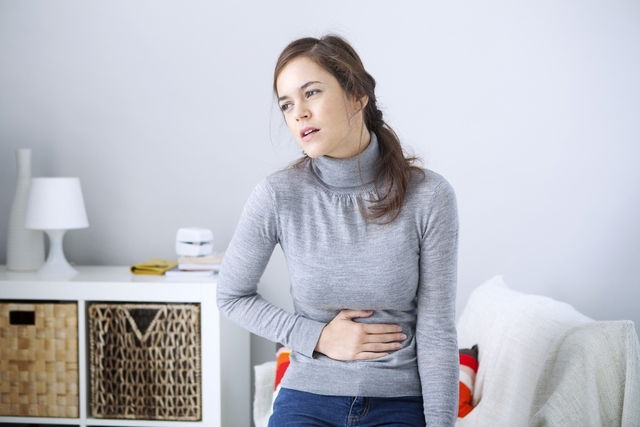Stress-induced gastritis is a stomach condition that is also known as functional dyspepsia or non-ulcer dyspepsia. Although it does not result in stomach inflammation like classic gastritis, it can cause similar symptoms such as heartburn, burning sensation and a feeling of a full stomach. This type of gastritis is triggered by emotional issues such as stress, anxiety and nervousness.
Stress-induced gastritis is curable, and can be treated with dietary changes and antacid medication, which helps to soothe the stomach’s mucosa so as not to cause heartburn.
An essential part of treatment also involves the management and coping of stress and emotions in general.

Main symptoms
The main symptoms of stress-induced gastritis are stomach pain and constant discomfort, however other symptoms may include:
- Nausea and a feeling of fullness;
- Abdominal bloating and pain
- Poor digestion and frequent burping;
- Headache and general malaise;
- Loss of appetite, vomiting or urge to vomit.
These symptoms may appear at any time but intensify during periods of stress or anxiety. Some of these symptoms may also be present in other types of gastritis, which may complicate the diagnosis. Learn more about the symptoms of gastritis and assess your risk for this condition using our online symptom checker.
Common causes
Stress-induced gastritis occurs mainly due to intense emotions like anxiety, stress and nervousness. These conditions trigger increased production of stomach acid, leading to gastritis-like symptoms.
It's important to remember that there's no such thing as nervous gastritis, and that it is a popular term used for functional dyspepsia. Emotional stress and anxiety do not cause direct inflammation in the stomach, but they can increase the production of gastric acid, which leads to symptoms similar to those of gastritis.
Physical stress from severe trauma, burns or brain injuries can also alter gastric pH, causing stress-induced gastritis.
Treatment options
Treatment for stress-induced gastritis should be directed by a gastroenterologist, and may include:
1. Medication
Your doctor may prescribe medication to reduce the stomach acid production and manage symptoms like pain, burning and acidity. Your doctor may also consider medications that inhibit acid production, such as omeprazole or pantoprazole. Anti-depressants and antacids may also be an option.
Check-out a list of medications that are commonly prescribed for gastritis treatment.
2. Diet
To reduce stomach acid production and relieve pain and burning, you should avoid high-fat foods such as red meat, sausage, bacon, whole milk, sauces of any kind, yellow cheeses, cream cheese, stuffed cookies and sausages in general.
When treating stress-induced gastritis, you should opt for foods that are easy to digest and low in fiber, such as:
- Low-fat meats, such as chicken, turkey and white fish
- Cooked vegetables such as carrots, eggplant, pumpkin and zucchini
- Unpeeled fruit such as apples, peaches, papaya, bananas and pears
- Grains and tubers, such as white rice, pasta, potatoes and sweet potatoes without skin
- Dairy products such as skimmed milk, natural yogurt and white cheeses such as ricotta and light curd
- Natural spices, such as herbs, garlic, onion, parsley, coriander and oregano
Once symptoms have settled, you can gradually return to normal eating habits, but it's important to eat a balanced and healthy diet. Other important precautions include not lying down after meals, avoiding drinking liquids during meals, eating slowly, chewing your food well and avoiding alcohol and cigarettes.
Learn more about the gastritis diet and be sure to see our 3-day meal plan to get an idea of what to eat.
3. Psychotherapy
Depending on the degree of stress, anxiety or nervousness you experience, the doctor may also recommend psychotherapy to help treat emotional problems. This can indirectly help to improve symptoms of gastritis.
4. Physical activity
Regular exercise is important to optimize digestion, reduce stress and anxiety and boost hormone production, all which contribute to pleasure and well-being.
5. Home remedies
Some home remedies that can help treat stress-induced gastritis are peppermint, passion fruit, lavender and ginger tea to relieve nausea and vomiting. Activated charcoal can also help to reduce intestinal gas production. Learn about other home remedies for gastritis.
Check-out other home remedies for gastritis that you can use to complement your prescribed medical treatment.
Can stress-induced gastritis turn into cancer?
Stress-induced gastritis cannot become cancer because this type of gastritis does not cause any actual inflammation of the stomach. The test used to diagnose gastritis, called an endoscopy, doesn’t show the presence of any stomach lesions, which reduces the probability for the development of stomach cancer.
